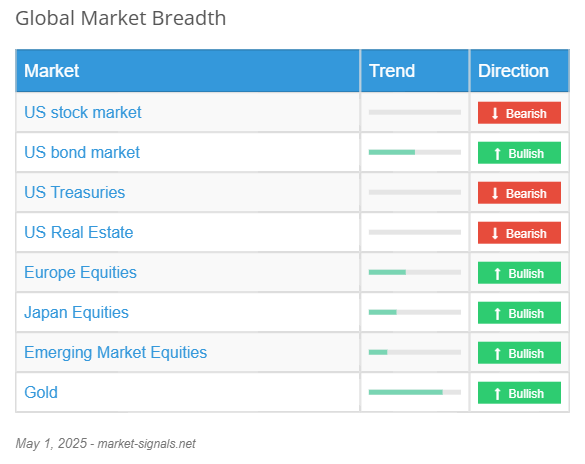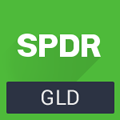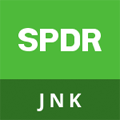This document has been compiled using indicators provided by the Market-Signals trading bot which studies global market data. This document shows the evolution of the strategies proposed by the bot and gives the trends of a selection of ETFs, which follow the main world markets, for May 2025. The strategies hold only long positions. No leverage is used. This document is for information purposes only and should not be taken as investment advice.
Global Market Breadth
| Market | Trend | Direction |
|---|---|---|
| US stock market |
|
|
| US bond market |
|
|
| US Treasuries |
|
|
| US Real Estate |
|
|
| Europe Equities |
|
|
| Japan Equities |
|
|
| Emerging Market Equities |
|
|
| Gold |
|

Portfolios
US Growth Portfolio
T
he portfolio US Growth remained stable in April. We see a falling trend in the U.S. equity market, we assume a Risk-Off market regime and the portfolio is allocated to a long-term U.S. Treasury Bond ETF (TLT). The asset allocation remains the same this month. The level of risk of the strategy for May is low with a Risk Score steady of 0 out of 10.
The 1-year performance of this strategy is 3.64%. Since opening the portfolio at eToro in November 2019, the strategy has performed 122.98%, in comparison, the benchmark asset (S&P 500) has advanced 98.49%. The strategy has suffered a maximum loss of 19.95% since the portfolio opened at eToro, compared to the benchmark asset (S&P 500) which lost 23.89% at maximum.
This strategy captures the U.S. stock market growth for long-term investors who want high returns.
Since inception at eToro
Max drawdown
Since inception at eToro
Portfolio: -19.95%
S&P 500: -23.89%
- eToro portfolio
US Balanced Portfolio
T
he portfolio US Balanced dropped 0.93% in April. The strategy combines an allocation in US bonds (30%) with the US Growth portfolio (70%). The trend in the US bond market for May is bullish. The bond part contains the following 2 Exchange Traded Funds: BND and LQD. Asset allocation remains the same this month. The asset allocation is as follows: TLT (70%), BND (15%) and LQD (15%). The portfolio trend for May is lightly bullish with a Trend Score unchanged of 1 out of 10. The degree of risk of the strategy for this month is medium with a Risk Score in expansion of 4 out of 10.
The 1-year performance of this portfolio is 3.38%.
This strategy provides a balanced stocks and bonds allocation for investors who want a U.S. market exposure with limited risks.
Global Conservative Portfolio
T
he portfolio Global Conservative bounced back 0.11% in April. The Strategy combines a multi-market protective asset allocation strategy (Global Stable portfolio 70%) and a US stock market strategy (US Growth portfolio 30%). The 2 ETFs of the portfolio for this month are IEF (70%) and TLT (30%). The portfolio trend for May is bullish with a Trend Score in progression of 4 out of 10. The level of risk of the strategy for this month is low with a Risk Score in expansion of 3 out of 10.
The 1-year trailing return of this strategy is 8.54%.
This strategy provides a broad geographic diversification for investors who want an international exposure.
Global Stable Portfolio
T
he portfolio Global Stable shifted upwards 1.24% in April. The overall market trend for May is weakly positive. By analyzing a diverse multi-market composed of 12 Trackers (stocks, bonds, gold, real estate, international and emerging markets...), we observe that 7 assets show a positive evolution. Our model allocates 0% to Risk-On assets and 100% to Risk-Off assets. The ETF selected in the portfolio for this month is IEF (100%). The portfolio trend for May is bullish with a Trend Score in progression of 6 out of 10. The degree of risk of the strategy for May is low with a Risk Score in expansion of 3 out of 10.
The 1-year trailing return of this strategy is 11.24%.
This is the safest strategy, the one with the lowest volatility and the least max drawdown of the 4 offered, that makes this strategy an alternative to a 1-Year Term Deposit.
ETF Trends
GLD SPDR Gold
- Gold
The GLD ETF, which replicates gold, continues its strong increase of 5.42% in April. The performance over a period of 1 year of this ETF is 43.60%. The trend in May is measurably bullish with a Trend Score stable of 8 out of 10. The level of risk of this ETF in May is high with a Risk Score in progression of 8 out of 10.
IEF iShares 7-10 Year Treasury Bond ETF
- Intermediate-term US Treasuries
The IEF ETF from iShares, which replicates intermediate-term U.S. Treasury bonds, continued to gain ground by 0.73% in April. The 1 year trailing return of this Exchange-Traded Fund is 5.49%. The trend in May is positive with a Trend Score in expansion of 6 out of 10. The level of risk of this Exchange-Traded Fund in May is low with a Risk Score in expansion of 3 out of 10. This ETF is invested in the portfolios Global Stable and Global Conservative in May.
BND Vanguard Total Bond Market ETF
- US Total Bond Market
The BND ETF, which mimics corporate and other investment-grade US fixed-income securities, bounced back 0.07% in April. The 1 year trailing return of this ETF is 4.29%. The trend in May is bullish with a Trend Score unchanged of 5 out of 10. The level of risk of this ETF in May is low with a Risk Score in rise of 3 out of 10. This Exchange-Traded Fund is present in the strategy US Balanced in May.
EFA iShares MSCI EAFE ETF
- Europe, Australia and Far East Equities
The EFA ETF, which tracks markets in Europe, Australia and the Far East, continues its strong increase of 3.70% last month. The 1 year trailing return of this ETF is 9.09%. The trend in May is bullish with a Trend Score in decline of 4 out of 10. The degree of risk of this ETF in May is high with a Risk Score in progression of 9 out of 10.
VGK Vanguard FTSE Europe ETF
- Europe Equities
The VGK Exchange-Traded Fund from Vanguard, which tracks the FTSE Europe All Cap Index, holds out its strong increase of 3.85% last month. The performance over a period of 1 year of this ETF is 10.77%. The trend in May is positive with a Trend Score in regression of 4 out of 10. The level of risk of this ETF in May is high with a Risk Score in progression of 8 out of 10.
EWJ iShares MSCI JAPAN ETF
- Japan Equities
The EWJ ETF from iShares, which mimics the Japanese stock market, holds out its strong increase of 4.19% in April. The performance over a period of 1 year of this equity is 5.97%. The trend in May is weakly bullish with a Trend Score in expansion of 3 out of 10. The level of risk of this equity in May is high with a Risk Score in expansion of 8 out of 10.
LQD iShares iBoxx $ Investment Grade Corporate Bond
- US Corporate Bonds
The LQD Exchange-Traded Fund from iShares, which follows U.S. investment grade corporate bonds, dropped 0.65% in April. The performance over a period of 1 year of this ETF is 2.88%. The trend in May is weakly bullish with a Trend Score in regression of 2 out of 10. The degree of risk of this ETF in this month is low with a Risk Score in expansion of 3 out of 10. This equity is present in the strategy US Balanced in May.
EEM iShares MSCI Emerging Markets ETF
- Emerging Market Equities
The EEM Exchange-Traded Fund from iShares, which replicates an index composed of companies from emerging markets, continued to grow by 0.14% in April. The performance over a period of 1 year of this ETF is 7.50%. The trend in May is lightly bullish with a Trend Score in decline of 2 out of 10. The level of risk of this ETF in this month is high with a Risk Score in growth of 7 out of 10.
JNK SPDR Bloomberg High Yield Bond
- High Yield Bonds
The JNK ETF, which follows the Bloomberg Barclays US High Yield index, decreased 0.62% last month. The evolution of the performance of this equity over 1 year is 1.08%. The trend in May is weakly positive with a Trend Score unchanged of 1 out of 10. The level of risk of this equity in this month is medium with a Risk Score in rise of 4 out of 10.
IWM iShares Russell 2000 ETF
- US Small Cap Equities
The IWM ETF, which monitors an index of US small-cap stocks, retreated 2.32% in April. The evolution of the performance of this ETF over 1 year is -0.51%. The trend in May is negative. The level of risk of this ETF in May is medium with a Risk Score in progression of 6 out of 10.
MDY SPDR S&P Midcap 400
- Midcap 400
The MDY ETF from SPDR, which follows 400 U.S. mid-cap stocks, retreated 2.38% in April. The performance over a period of 1 year of this equity is -0.38%. The trend in May is bearish. The degree of risk of this equity in this month is medium with a Risk Score in growth of 6 out of 10.
QQQ Invesco QQQ
- Nasdaq 100
The QQQ ETF, which tracks 100 largest US companies in the non-financial sector, shifted upwards 1.40% in April. The evolution of the performance of this Exchange-Traded Fund over 1 year is 12.03%. The trend in May is negative. The degree of risk of this Exchange-Traded Fund in May is high with a Risk Score in growth of 7 out of 10.
SPY SPDR S&P 500 ETF
- S&P 500
The SPY ETF from SPDR, which monitors the US large-cap space, fell 0.87% in April. The performance over a period of 1 year of this ETF is 10.58%. The trend in May is bearish. The level of risk of this ETF in this month is high with a Risk Score in expansion of 8 out of 10.
VNQ Vanguard Real Estate ETF
- US Real Estate
The VNQ ETF, which follows REITs and other real estate-related investments, decreased 2.44% in April. The evolution of the performance of this ETF over 1 year is 11.39%. The trend in this month is bearish. The level of risk of this ETF in May is medium with a Risk Score in growth of 6 out of 10.
TLT iShares 20+ Year Treasury Bond ETF
- Long-Term US Treasuries
The TLT Exchange-Traded Fund, which replicates long-dated US Treasuries, decreased 1.71% in April. The 1 year trailing return of this equity is 1.14%. The trend in this month is negative. The level of risk of this equity in this month is medium with a Risk Score in growth of 4 out of 10. This ETF is invested in the portfolios Global Conservative and US Balanced in May.
Compliance disclaimer
This communication is for information and education purposes only and should not be taken as investment advice, a personal recommendation,
or an offer of, or solicitation to buy or sell, any financial instruments.
Natevia makes no representation and assumes no liability as to the accuracy or completeness of the content of this publication,
which has been prepared utilizing publicly-available information.
Past Performance is not indicative of future results.














